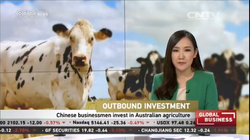Xinhua | 24 July 2015
Chinese businessmen invest in Australian agriculture
BEIJING, July 24 (Xinhuanet) -- Australia is poised to ride a wave of foreign investment in its agricultural sector. Farms and cattle stations are becoming increasingly attractive to overseas investors - especially Chinese buyers looking for beef sources in other countries.
(Watch video report)
The backdrop for Hailiang’s recently opened Australian office is Sydney’s picturesque harbour - but the focus for Carson Tang and Nathan Gan is much more rural - and with good reason.
"Because of the large population base in China - 1.4 billion people an the population has left us short of supply and that has caused some food issues but Australia only has 24 million people and vast land," said Nathan Gan.
In March, Hailiang took its first investment steps into that vast land - buying almost $30 million (USD) worth of cattle stations in Queensland.
It’s among a growing number of Chinese investors who’ve either bought rural properties here - or are looking to invest.
"Everyone knows Australian beef is known for its good quality, disease free high end - so that’s why we are investing here," Gan said.
And the timing is good.
The Free Trade Agreement between Australia and China is expected to remove some of the barriers for overseas investors. And after years of drought and dropping prices - banks are looking to sell foreclosed properties.
Another factor making Aussie cattle like these even more attractive to overseas buyers is the sinking Aussie dollar which has been hovering around 74 US cents.
"It’s not purely on return of investment - but to look at it from another angle - to have a strategy on how to feed the growing population," said Dominic Ong, from Knight Frank.
But not everyone is happy about Australian farms being snapped up by overseas investors. Australia’s government wants to tighten rules on foreign purchase of agricultural land and create a foreign ownership registry. Hailiang says it has no plans to change its recently purchased properties.
"We want to keep the local operation team - we want to keep it as local as possible," said Tang.
"We will further invest in things like irrigation so we will have more investment and along with that we will probably employ more staff there," Gan said.
At the moment - the majority of overseas buyers are Chinese. But experts expect the low dollar and availability of rural opportunities to attract investors from other countries as well.
Chinese businessmen invest in Australian agriculture
BEIJING, July 24 (Xinhuanet) -- Australia is poised to ride a wave of foreign investment in its agricultural sector. Farms and cattle stations are becoming increasingly attractive to overseas investors - especially Chinese buyers looking for beef sources in other countries.
(Watch video report)
The backdrop for Hailiang’s recently opened Australian office is Sydney’s picturesque harbour - but the focus for Carson Tang and Nathan Gan is much more rural - and with good reason.
"Because of the large population base in China - 1.4 billion people an the population has left us short of supply and that has caused some food issues but Australia only has 24 million people and vast land," said Nathan Gan.
In March, Hailiang took its first investment steps into that vast land - buying almost $30 million (USD) worth of cattle stations in Queensland.
It’s among a growing number of Chinese investors who’ve either bought rural properties here - or are looking to invest.
"Everyone knows Australian beef is known for its good quality, disease free high end - so that’s why we are investing here," Gan said.
And the timing is good.
The Free Trade Agreement between Australia and China is expected to remove some of the barriers for overseas investors. And after years of drought and dropping prices - banks are looking to sell foreclosed properties.
Another factor making Aussie cattle like these even more attractive to overseas buyers is the sinking Aussie dollar which has been hovering around 74 US cents.
"It’s not purely on return of investment - but to look at it from another angle - to have a strategy on how to feed the growing population," said Dominic Ong, from Knight Frank.
But not everyone is happy about Australian farms being snapped up by overseas investors. Australia’s government wants to tighten rules on foreign purchase of agricultural land and create a foreign ownership registry. Hailiang says it has no plans to change its recently purchased properties.
"We want to keep the local operation team - we want to keep it as local as possible," said Tang.
"We will further invest in things like irrigation so we will have more investment and along with that we will probably employ more staff there," Gan said.
At the moment - the majority of overseas buyers are Chinese. But experts expect the low dollar and availability of rural opportunities to attract investors from other countries as well.












